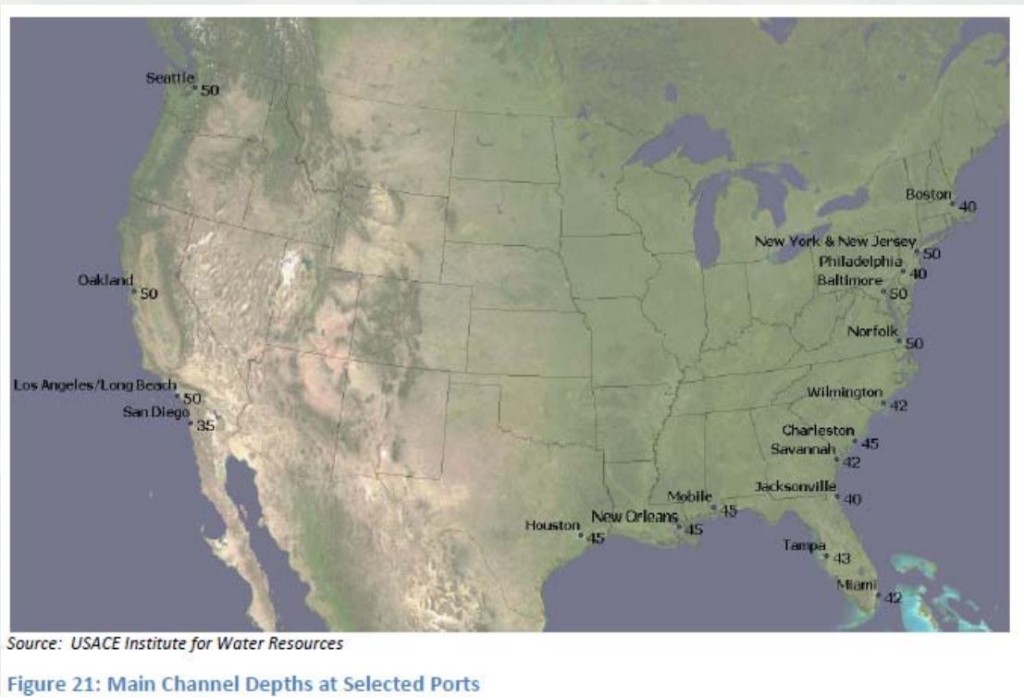If we learned one lesson from the disastrous dredging of the Miami Bay, it’s not to trust the U.S Army Corps of Engineers to protect our marine environment
See Florida port dredging projects under attack after Port of Miami dredging destroys hundreds of acres of coral reefs, and Miami port expansion kills endangered coral, as environmentalists feared for more information on the Army Corps of Engineers dismal track record.
Unfortunately, the desire to desire to gamble with people’s money (tax dollars) often overwhelms common sense.
Despite the fact that the nearby Port of Savannah (just 141 miles away) can already accommodate Post-Panamax ships that carry 6000 ocean containers, and dredging is underway to deepen the port to 47 feet so it can accommodate even larger ships, boosters in Jacksonville, Florida want to invest almost $700 million of (mostly) taxpayer funds to deepen 13 miles of the St. Johns River to the same depth.
But, that’s not the only problem with this plan – additionally, Jacksonville has inadequate rail connections to serve a port – which would cost an additional $200 million of, you guessed it, tax dollars.
The experts who warn that this is a crap shoot have been ignored.
“Jean-Paul Rodrigue, a Hofstra University professor and an expert in the field of transportation economics, said that cities, including three within 240 driving miles (Jacksonville; Savannah, Georgia; and Charleston, South Carolina) of one another, are gambling that deepening their ports will bring more cargo ships in spite of the fact that competition among them is a “zero sum game,” in which “whatever somebody gains is going to be at the expense of the other.” He added that, particularly considering the current slowdown of global economic growth, there is not likely to be enough of an increase of traffic to justify all those projects. The bigger ships are not going to create by magic more business,” he said.”
And their dreams ignore St. Johns Riverkeeper warnings of the damage the project is likely to do:
“.. the permit and the proposed project fail to protect our river from the likely damage that will occur from removing 18 million cubic yards of rock and sediment to deepen the river from 40 to 47-feet.
The dredging will result in harmful sedimentation, erosion and shoaling and cause salt water to move farther upstream. The increase in salinity will likely damage or destroy hundreds of acres of wetlands, submerged grasses, and trees in parts of the river and its tributaries, such as Julington Creek and Ortega River. Critical habitat for fisheries and pollution filters for our river will be lost in the process.”
Even more amazing, this work is being proposed to serve just one terminal operator, TraPac, a Japanese company which according to the most recent figures I could find, is operating at about 20 percent capacity.
For more information, check out the references below:
JAXPORT AS AN URBAN GROWTH STRATEGY: COMMUNITY IMPLICATIONS AND PROSPECTS, Northeast Florida Center for Community Initiatives
The siren song of deep water: Ports race to accommodate post-Panamax ships, Aljazeera America
Dredging Project Fails to Protect Our River, St. Johns Riverkeeper
St. Johns River Dredging Factsheet, St Johns Riverkeeper
Army Corps, environmentalists disagree on likely impact of river deepening, Florida Times Union
Port Authority faces roadblocks in quest to realize its potential, Florida Times Union (Jacksonville)

